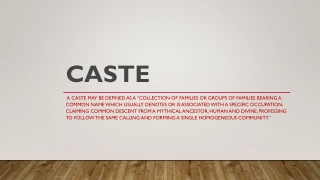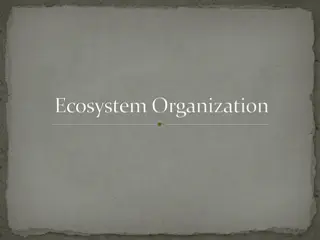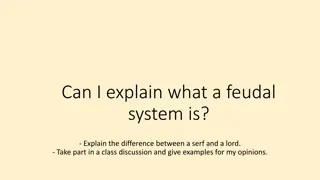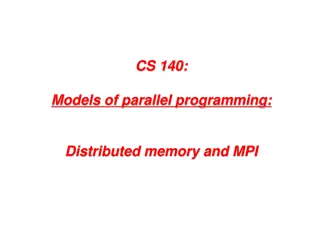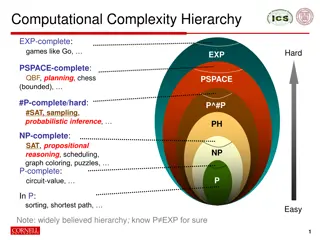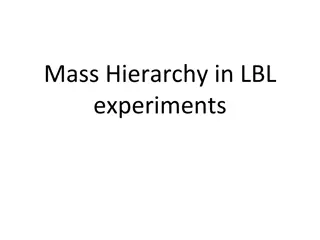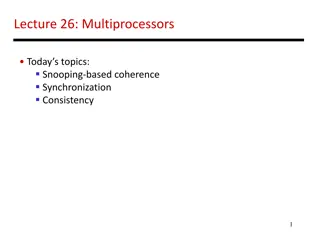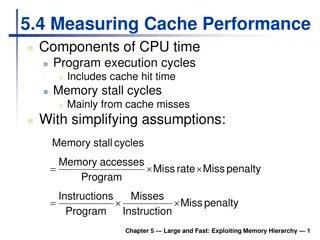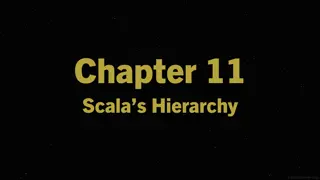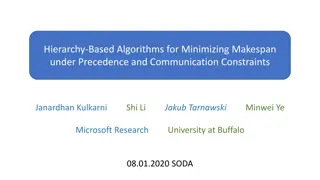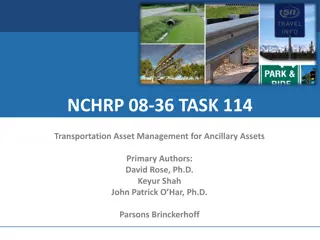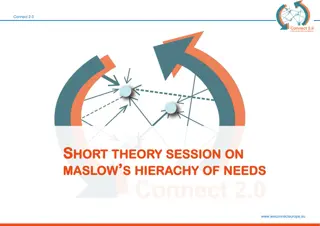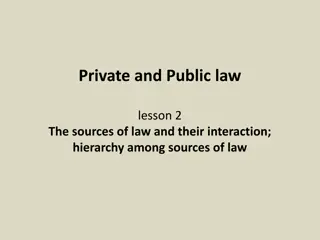Overview of Caste System in India
The caste system in India is a social structure defined by hereditary groups, each with specific occupations, rules, and traditions. Membership is based on birth, leading to a rigid hierarchy and limited mobility between castes. Endogamy, occupation, commensality, and purity are key features that sh
0 views • 17 slides
Overview of Antiarrhythmic Drugs Use and Classification
Antiarrhythmic drugs are classified into different classes based on their mechanisms of action. Class I includes sodium channel blockers with specific drugs like procainamide, disopyramide, and quinidine. Class 1B involves lidocaine and mexiletine. Class 1C consists of agents like flecainide. Class
2 views • 19 slides
Introduction to Operating Systems
Explore the concepts of address translation, Translation Lookaside Buffer (TLB), TLB usage in modern processors, TLB invalidate mechanisms, and hardware design principles related to memory hierarchy using examples from the Intel i7 processor. Understanding the trade-offs and costs associated with TL
0 views • 30 slides
Understanding Maslow's Hierarchy of Needs in Humanistic Psychology
Humanistic psychologists, such as Abraham Maslow and Carl Rogers, viewed personality as a quest for self-determination and self-realization. Maslow's hierarchy of needs illustrates how individuals progress from fulfilling basic physiological needs to achieving self-actualization and self-transcenden
0 views • 25 slides
Understanding Ecosystem Organization and Hierarchy
Explore the intricate relationships within ecosystems through the study of organization and hierarchy. From individual organisms to complex communities, learn how biotic and abiotic factors shape these environments. Gain insights into the levels of ecosystem organization, from single organisms to in
5 views • 15 slides
Analytic Hierarchy Process (AHP) for Sustainable Smart Industry Curriculum Development
Intelligent Decision Support Systems and the Analytic Hierarchy Process (AHP) play a crucial role in the development of a Master's Degree Program in Industrial Engineering for Thailand's Sustainable Smart Industry. AHP, developed by Thomas Saaty, aids in measuring intangible factors through paired c
0 views • 23 slides
Understanding Hierarchy Change Processes in Tatmeen
Discover the hierarchy change processes within Tatmeen's distribution system involving packaging, serialization, and association of products at different levels. Learn about the modes of hierarchy change - Pack, Unpack, and Unpack All - and how they impact the distribution process to ensure efficien
0 views • 68 slides
Aristotle's Justification of Hierarchy and Republican Aspects of Citizenship
Aristotle's concept of citizenship involves a hierarchical structure where ruling and being ruled in turn is essential. He justifies this hierarchy by emphasizing the advantageous nature of ruling and being ruled. However, his views on citizenship in Greek city-states were limited to adult males, hi
4 views • 6 slides
Understanding Injections and Infusions in Healthcare
Determining the hierarchy of injections and infusions is crucial in medical coding and billing. Infusions are prioritized over pushes, which are prioritized over injections. This hierarchy should be followed for accurate reporting and coding. IV Infusion Therapy involves administering fluids or medi
0 views • 57 slides
Understanding Chomsky Hierarchy in Language Theory
Explore Chomsky Hierarchy in language theory, including different types of languages, grammars, and automata. Learn how to prove if a language is regular, context-free, recursive, or recursively enumerable. Understand the closure properties of regular, context-free, recursive, and recursively enumer
2 views • 10 slides
Overview of Grammar Types and Chomsky Hierarchy
The four types of grammars are General, Context-Sensitive, Context-Free, and Linear grammars, each recognizing a specific set of languages. Chomsky Hierarchy categorizes these grammars into four levels, indicating subsets of languages they can recognize. Context-free grammars have specific productio
0 views • 17 slides
Redesigning the GPU Memory Hierarchy for Multi-Application Concurrency
This presentation delves into the innovative reimagining of GPU memory hierarchy to accommodate multiple applications concurrently. It explores the challenges of GPU sharing with address translation, high-latency page walks, and inefficient caching, offering insights into a translation-aware memory
1 views • 15 slides
Understanding Resilience Through Maslow's Hierarchy of Needs
Exploring the concept of resilience through Abraham Maslow's Hierarchy of Needs, which outlines the progression of human needs from basic physiological requirements to self-actualization and intrinsic values. Recognizing the importance of interpersonal relationships in fostering resilience, especial
0 views • 12 slides
Understanding the Feudal System: Lords, Serfs, and Hierarchy
The Feudal System was a social hierarchy where the king held control, and peasants did the work at the bottom. Lords owned the land while serfs worked on it. Explore the differences between a lord and a serf, how the system provided order and stability, and the new form introduced in England. Join a
1 views • 5 slides
Understanding Maslow's Hierarchy of Needs Through "Homeless to Harvard" Play-doh Activity
Explore the story of "Homeless to Harvard" by creating Play-doh examples of how David's needs were met at each level of Maslow's Hierarchy. Use quoted text evidence to explain the fulfillment of physiological, safety, love/belonging, esteem, and self-actualization needs. Follow instructions to photo
0 views • 7 slides
Understanding Organisational Structure and Hierarchy in the Workplace
Organisational structure plays a vital role in defining how a business operates, encompassing elements like hierarchical arrangements, functional areas, and chain of command. Hierarchy within an organization determines accountability and communication channels, while the span of control impacts supe
1 views • 16 slides
The Mitigation Hierarchy in the World Bank Environmental & Social Framework Overview
The content discusses the Management of risks and impacts within the World Bank's Operational Policies and Bank Procedures, highlighting the incorporation of the Mitigation Hierarchy in the Environmental & Social Framework. It addresses key elements, drivers, challenges, and the need for clarity in
1 views • 17 slides
Introduction to Java GUI with Swing Part I
Understanding Java GUI components with Swing and AWT, top-level containers, containment hierarchy concepts, menu bars, content panes, and component hierarchy. Exploring various container classes and their roles in GUI programming.
1 views • 64 slides
Amoeba Cache: Adaptive Blocks for Memory Hierarchy Optimization
The Amoeba Cache introduces adaptive blocks to optimize memory hierarchy utilization, eliminating waste by dynamically adjusting storage allocations. Factors influencing cache efficiency and application-specific behaviors are explored. Images and data distributions illustrate the effectiveness of th
0 views • 57 slides
UFIRST Roles and Organizational Hierarchy Overview
Explanation of various roles within UFIRST system, including Grants Administrators, Approvers, Workflow Administrators, and Study Staff. Details on access levels, training requirements, and organizational hierarchy structure within UF. Key personnel roles and responsibilities outlined for effective
0 views • 9 slides
Understanding Parallel Programming and Memory Hierarchy in Triton
Explore the concepts of parallel programming, distributed memory, and memory hierarchy in the context of Triton, focusing on technology trends, processor clock speeds, machine architecture, and memory organization at different levels (chip, node, system).
0 views • 23 slides
Insights into Computational Complexity Hierarchy and SAT Algorithms
The computational complexity hierarchy explores classes of problems like EXP-complete, PSPACE-complete, and more. SAT algorithms, such as local search methods and survey propagation, offer new insights into practical complexity. Discover the interplay between tractable and intractable structures in
0 views • 12 slides
Understanding Caches and the Memory Hierarchy in Computer Systems
Delve into the intricacies of memory hierarchy and caches in computer systems, exploring concepts like cache organization, implementation choices, hardware optimizations, and software-managed caches. Discover the significance of memory distance from the CPU, the impact on hardware/software interface
0 views • 84 slides
Understanding Analytic Hierarchy Process (AHP) in Decision Making
Analytic Hierarchy Process (AHP) is a method developed by Prof. Thomas L. Saaty for deriving ratio scales from paired comparisons. It involves levels of analysis starting from the goal to alternative choices, considering both objective measurements and subjective opinions. Pair-wise comparisons are
0 views • 19 slides
Analogies in TKM: Characters, Themes, and Social Hierarchy
Explore analogies in "To Kill a Mockingbird" focusing on characters like Tom Robinson, Boo Radley, and Calpurnia, as well as themes of innocence vs. experience and social hierarchy illustrated through the Finches and Ewells. Delve into the rich narrative of Harper Lee's classic novel with insightful
0 views • 9 slides
Insights into Mass Hierarchy Determination in Long-Baseline Neutrino Experiments
Combining appearance probabilities of electron and anti-electron neutrinos in long-baseline experiments can help determine the mass hierarchy, with ongoing experiments collecting significant data by 2020. Analyses point to CP violation possibilities, with updates expected in Neutrino2016. The capabi
0 views • 6 slides
Understanding Multiprocessors and Memory Hierarchy
Explore topics such as snooping-based coherence, synchronization, consistency, virtual memory overview, address translation, memory hierarchy properties, TLB functionality, TLB and cache access considerations, and cache indexing strategies in multiprocessor systems.
0 views • 22 slides
Understanding Cache Performance Components and Memory Hierarchy
Exploring cache performance components, such as hit time and memory stall cycles, is crucial for evaluating system performance. By analyzing factors like miss rates and penalties, one can optimize CPU efficiency and reduce memory stalls. Associative caches offer flexible options for organizing data
0 views • 22 slides
Understanding Scala's Class Hierarchy and Value Classes
Scala's class hierarchy includes Any, AnyVal, and AnyRef classes, with implicit conversions and implementations of primitives similar to Java. Learn about defining value classes, natural and reference equality comparisons, and more in Scala programming.
0 views • 24 slides
Hierarchy-Based Algorithms for Minimizing Makespan under Precedence and Communication Constraints
This research discusses hierarchy-based algorithms for minimizing makespan in scheduling problems with precedence and communication constraints. Various approximation techniques, open questions in scheduling theory, and QPTAS for different settings are explored, including the possibility of beating
0 views • 25 slides
Detailed Road Hierarchy and Maintenance Plan
This document outlines the road hierarchy with categories 1-5, including gravel, sheeted, and sawed roads, along with the list of specific roads in each category and their corresponding length. It also highlights the upcoming maintenance plans such as grading after autumn rains, prioritizing Categor
0 views • 9 slides
Understanding Memory Hierarchy and Different Computer Architecture Styles
Delve into the concepts of memory hierarchy, cache optimizations, RISC architecture, and other architecture styles in embedded computer architecture. Learn about Accumulator and Stack architectures, their characteristics, advantages, and example code implementations. Explore the differences between
0 views • 52 slides
Understanding Lawson Security: Basics, Hierarchy, and Administration Tools
This comprehensive guide covers essential aspects of Lawson Security, including an overview of security components, user roles, secured objects, and implementation methodology. Learn about the hierarchy structure, what can be secured, rules, and the tools available for security administrators and RM
0 views • 28 slides
Understanding Memory Hierarchy in Parallel Computer Architecture
This content delves into the intricacies of memory hierarchy, caches, and the management of virtual versus physical memory in parallel computer architecture. It discusses topics such as cache compression, the programmer's view of memory, virtual versus physical memory, and the ideal pipeline for ins
1 views • 86 slides
Transportation Asset Management for Ancillary Assets Overview
This project focuses on asset management for ancillary assets in transportation, providing information on classification hierarchy, life cycle management, state-of-the-practice, and recommended business processes. Tasks include project kickoff, developing hierarchy, documenting practices, identifyin
0 views • 17 slides
Understanding Analytic Hierarchy Process (AHP) for Decision Making
Analytic Hierarchy Process (AHP) is a decision-making method developed by Prof. Thomas L. Saaty for handling multi-criteria problems in business environments. It involves creating ratio scales from paired comparisons to prioritize goals, criteria, and alternatives based on subjective opinions and ac
0 views • 19 slides
Understanding Maslow's Hierarchy of Needs
Explore Abraham Maslow's groundbreaking Hierarchy of Needs theory, encompassing physiological, safety, love/belongingness, esteem, and self-actualization needs. Delve into Maslow's biography, the original needs delineation, educational applications, and a critical evaluation. Gain insights into Masl
0 views • 15 slides
Overview of Legal System in Australia
This content covers various aspects of the legal system in Australia, including common law, sources of law, court hierarchy, appeals process, federal courts, and the importance of judicial independence. It outlines the key components of the legal framework, such as the role of Parliament, judge-made
0 views • 36 slides
Understanding the Hierarchy and Interaction of Legal Sources
Delve into the complex world of legal sources and their hierarchy in private and public law. Explore the essence of norms, their subjects, and essential characteristics like positivism, enforceability, social relevance, and generality. Gain insights into how laws are formulated to govern society eff
0 views • 23 slides
Exploring Chomsky's Language Hierarchy
Delve into the Chomsky Hierarchy, ranging from Regular Languages to Context-Free and beyond. Learn about Noam Chomsky's remarkable contributions to linguistics, philosophy, and more, as well as the properties and examples of Regular and Context-Free languages.
0 views • 22 slides
